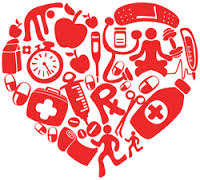Over 50 years ago, President Lyndon B. Johnson declared February to be American Heart Month. The tradition of Heart Health Month has continued on as we raise awareness about the various risk factors, symptoms, treatments, and most importantly lifestyles that contribute to either heart disease or heart health. Whether you are just starting to think about the importance of heart health or are in need of more information to live a healthy lifestyle, here are five things you should know this Heart Health Month.
Risks and Factors
One of the most important things you can learn this Heart Health Month is your personal risk factors for heart disease. These are the conditions, circumstances, behaviors, and inherited traits that could increase your likelihood of experiencing a heart attack or encountering cardiovascular problems. Some of these factors can be mitigated, reduced, or eliminated with lifestyle changes, medication, or treatments. The best thing to do to calculate your risks is to talk with your doctor. He or she will help you evaluate your lifestyle and genetic predisposition and consider the factors that are more severe than others. To get started with your personal assessment, see the American Heart Association’s list of Risk Factors.
Symptoms
It’s crucial to understand the signs of a heart attack especially if you have high risk factors. The AARP reminds us that the best thing to do if you think you are having a heart attack is to contact 911 and chew an aspirin. For now, make yourself aware of the symptoms so that if you or someone you know begins to show signs you can be prepared to act. Chest pain is the most commonly associated symptom. It may be present, but it may not be. Other symptoms might include trouble breathing or feeling dizzy. Common symptoms that sometimes go unnoticed include pain in around the left arm, nausea, fatigue, and jaw pain. If you or your loved one have high risk factors, talk with your doctor about specific symptoms and remember to act immediately if you experience any of these.
CPR
Whether you and your loved ones have high risk factors for heart disease or not, Heart Health Month is a good reminder to brush up on your CPR skills. Now is the time to learn or update your certification for this life-saving technique. The American Red Cross offers hands-on training to equip you with the knowledge and confidence to perform CPR in the event of a heart attack. CPR allows the provider to keep fresh, oxygenated blood moving to the brain, which can save the brain from damage and even death in the event of cardiac arrest. Heart attacks happen suddenly and your ability to step in and help with the follow up of professional responders and physicians may be the key to someone continuing to have a long, happy life.
Diet and Nutrition
It’s not always the most fun topic to consider, but what you eat and what you don’t eat can go a long way in cultivating a healthy heart lifestyle. Start thinking about making healthy choices and make it a goal to begin a better lifestyle during heart health month. A balanced diet of fresh fruits and vegetables, lean meats and proteins, and low in processed foods and sugars is ideal. The AARP recommends making wise substitutions in your daily meal plans to focus on heart health. Replace red meat with fish once a week. Consider a meatless Monday or other day each week and load up on vegetables. Remove skin from poultry before eating. Replace sugary drinks with water. For more ideas and for specific suggestions, talk with your doctor about your eating habits and how you might start incorporating heart healthy options.
Exercise (That Works for You)
Just like any other muscle, your heart needs exercise to stay strong. Aerobic exercise increases your heart rate and burns calories, which helps you lose weight and feel great along the way. This Heart Health Month is a great time to incorporate daily exercise into your routine. The Alzheimer’s Association recommends moderate exercise for 30 minutes per day to keep your heart strong. As you consider adding exercise to your routine, be aware and honest about what works for you. Realize your own limitations, preferences, and abilities. Introduce a plan that you are most likely to enjoy and stick to. Your moderate exercise might include walking around the block, swimming in your backyard pool, or jogging on a treadmill. Get a partner or friend to join you and make it something you look forward to every day.
Making yourself aware of the factors, symptoms, and proper responses to cardiovascular issues will empower you to make heart healthy daily choices and to be prepared in an emergency. This Heart Health Month arm yourself with the tools you need to care for your heart.


